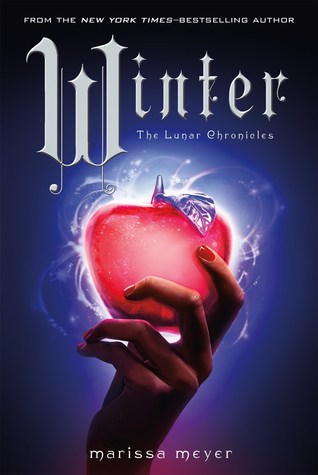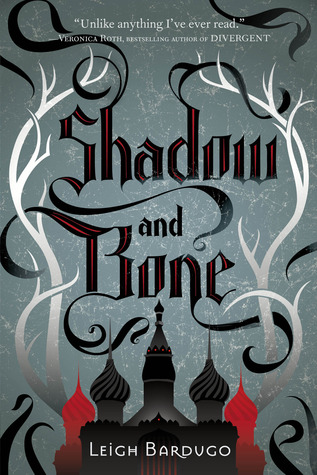 Winter (The Lunar Chronicles, #4) by Marissa Meyer
Winter (The Lunar Chronicles, #4) by Marissa MeyerPublished: November 10th 2015 by Feiwel and Friends
Pages: 827
Princess Winter is admired by the Lunar people for her grace and kindness, and despite the scars that mar her face, her beauty is said to be even more breathtaking than that of her stepmother, Queen Levana.
Winter despises her stepmother, and knows Levana won’t approve of her feelings for her childhood friend—the handsome palace guard, Jacin. But Winter isn’t as weak as Levana believes her to be and she’s been undermining her stepmother’s wishes for years. Together with the cyborg mechanic, Cinder, and her allies, Winter might even have the power to launch a revolution and win a war that’s been raging for far too long.
Can Cinder, Scarlet, Cress, and Winter defeat Levana and find their happily ever afters?
“Her whole body was wound up tight. She was ready to storm the palace herself - an army of one.”All series must come to an end, which was also the case for Marissa Meyer's Winter. For us readers, it is a natural instinct to be cautious when it comes to the last installment. The expectations are sky-high, the excitement is palpable, which makes possible disappointments unavoidable. After finishing this eight hundred-page book, I wondered why it felt like I didn't encounter any disappointments. Satisfying conclusions are hard to find, and a gem even less. To be honest, I'm currently just grinning of joy and holding the book in my arms like a newborn baby. Winter was truly everything I hoped it would be, making it a very satisfying conclusion to one of my all-time favourite series.
Much to my surprise, this book actually turned out to be eight hundred pages long. I half expected to sometimes struggle my way through, as I normally do with books this long. However, it was quite the surprise when I didn't. It read like any other young-adult novel, regardless of the ridiculous amount of pages. If an author can make you feel like you didn't just spent hours and hours reading, I think it shows just how talented they are.
Meyer's talent didn't just stop there, but was noticeable all the way through. A brilliant example is her use of the original fairy tales. Without having to spoil things, I absolutely adored how she weaved the storylines from Snow White into the main plot. Therefore, there were a lot of unexpected twists and turns I should have seen coming. When I thought I had seen it all, a particular scene at the end of the book came along, and was just lovable to read.
Things were looking up at the end of Cress, but there was still so much yet to happen and so many things that needed to be done. That was why every single page felt absolutely necessary, despite the length of the book. Throughout the story, I couldn't help but notice that Meyer really took her time writing it. There was no rush. Everything was built up slowly, yet at a steady pace, leading up to one of the best climaxes I had the pleasure to read. It was just so well done, and clearly payed off.
That can be seen as another aspect stepped into the picture, one I see far too less in final installments: credibility. There are these kind of books where the whole main crew of characters survive. Where everyone is happy, all the enemies are dead and no one is hurt. Without spoiling anything, I must say this wasn't the case with Winter. Everything that happened was so convincing. Setting up an entire rebellion doesn't happen in one day, and this book made that very clear. There were downfalls, captures, misfortune. It made me frustrated, but it isn't much better either if everything happens too smoothly. It led to palpable tension and nervosity, yet the writing flowed, resulting in long reading sessions because I had no intention of putting the book down.
As soon as Winter began, we were introduced to the fascinating world of Luna: once a simple colony on the moon, now a kingdom suppressed by a ruler with an iron fist. It was enjoyable to explore both Artemisia, the wealthy capital filled with aristocrats, but also the poor and hard-working outer sectors. Doesn't this general idea ring a bell? I, for one, couldn't help but be reminded of The Hunger Games at times. There were so many similarities, especially the way the citizens of Artemisia behaved and how the outer sectors were not able to be touch in with one another. It makes sense that dictatorships in young-adult literature share the same features, but it was a little too similar in my opinion.
Upon looking back at who they were at the beginning of the series, every single character has grown so much. Most of the characterization in this book wasn't very prominent, except for Cinder. She obviously had a lot to go through, but it was portrayed very well. Underneath all her bravery and fierceness, she is still a sixteen-year-old girl who is kind of overwhelmed, and it was actually comforting to see.
Aside from Cinder, I'd like the put all the attention on the two characters who already made their appearance in Cress: the princess and the guard. Just the simple fact that Winter has schizophrenia because she won't use Lunar gift, is awesome, intriguing and scary. I already knew a bit about the disorder because of my education, but seeing it being inserted into a story is a whole other level. An unreliable narrator is the least I would have expected to find in a sci-fi/fantasy series, but I am glad Meyer let it happen. Especially her visions were eerie and made me shiver, but seeing Jacin react to these kind of situations made my heart melt. I would have loved to have seen more of Winter and her relationship with Jacin, although it didn't necessarily felt lacking.
Though I certainly swooned a lot while reading, the romance didn't feel as present as it was in other books, but I am not complaining. It was light, subtle, yet there were enough scenes to make me fall in love with my ships all over again.
After writing all of this, I still feel like a mess and ready to cry because I have to say goodbye to a bunch of my favourite characters. As I still find myself in a state of denial, all I can do now is wait for Stars Above, which is only two months left. I'll survive.








